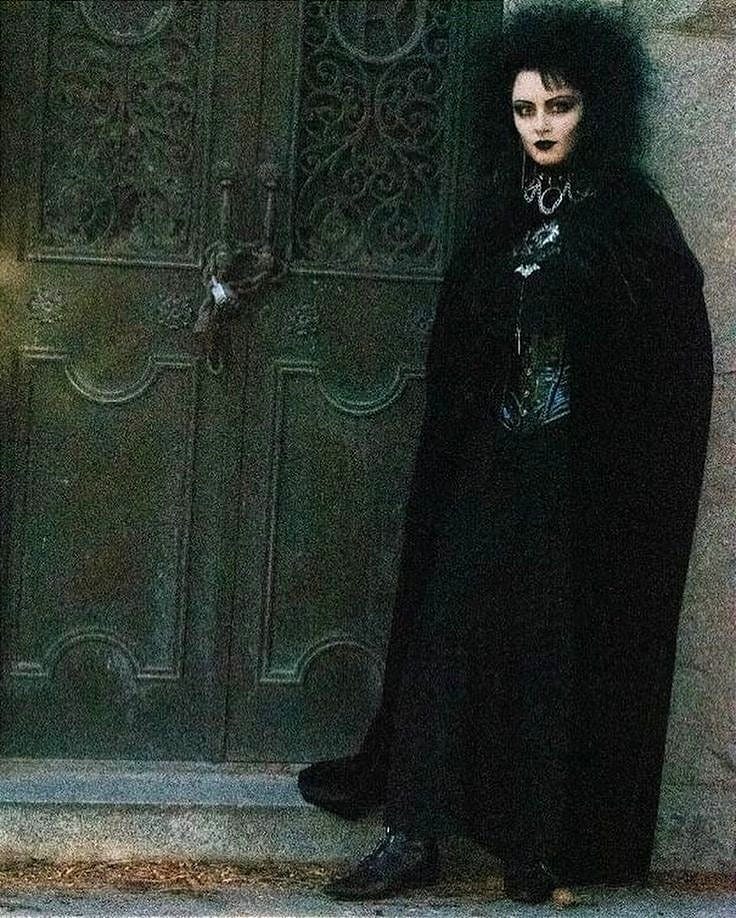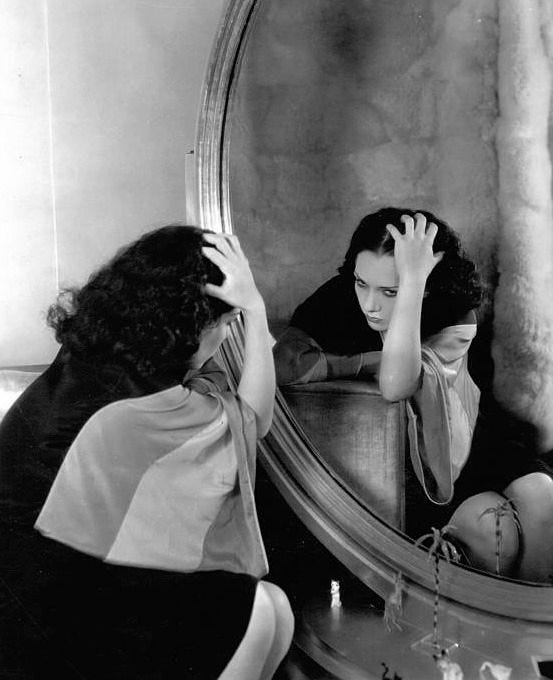The Authenticity Paradox.
A critique of aesthetic gatekeeping and online individualism amid the 'authentic weird girl' discourse.
In the rare moments that we take a minute to stop talking, and allow our visual identities to represent us, we are of course, still communicating. Our aesthetics are often associated with certain professions or subcultures, in addition to being associated with certain belief systems and even specific political camps.
There are historical, cultural, and social implications to our customisation, where trad goths express their ability to romanticise and embrace darkness, highlighting the subtleties of its beauty with high maintenance yet poetically macabre fashion, just as streetwear which has become a commodified aesthetic, started off as a dynamic and expressive blend of resistance, identity and practicality in the context of black culture. Where queer culture seeks to protest against the expectation that the individual would shrink themselves down, it can be recognised and celebrated by its definitive pride - represented by the rainbow in addition to a myriad of symbols that reclaim visibility.
In this way, we use style to communicate what it is we embody and that which we are distinctly opposed to.
The utilisation of aesthetics for communication would then, seemingly speak to our truest and most authentic selves and the hope is, that after many years of repression throughout childhood, that we might one day unzip the cloak and turn it inward, revealing on the outside what lives inside of us. Occasionally though, there is a competitiveness there, most commonly seen online where it has become all too easy to neatly package aesthetics and their associative signals. In this space, the game becomes a dirty race to authenticity and self-actualisation, complete with persistent glances to one's opponent and the occasional leg left out to trip them up.
In this arena, the most ruthless of competitors are bound to be those who hold resentment over the fact that at one point or another, they felt themselves drift towards the fringes of popular culture - a position from which they only hoped to belong, just to have been barred from that exclusive club. Having been met with cruelty and forced to reckon with the many ways in which they differed from others they might have learned to accept themselves far earlier than most. So now, when it has become popular to express individuality, they might even consider themselves the arbiters of ‘weirdness’.
A recent viral video on TikTok reads “You can always tell the difference between authentic weird girls and the performative ones”, after which women and girls in the comment section ventured a guess as to which of the most iconic ‘weird girl’ influencers has been putting on an act the entire time. The obvious pandering to misogyny is lost here for some reason, where women minding their business suddenly find themselves bombarded with accusations of the most unforgivable crime now - inauthenticity. The recent bastardisation of the concept of ‘The Male Gaze’ helps to explain this phenomenon, where women are quickly placed into two categories from which they’re either feeding or somehow operating outside of the male gaze. These associations are sloppily interwoven into the recent ‘weird girl’ discourse, where ‘authentic weird girls’ are seen to combat the male gaze, and the pretenders are its epitome in disguise.
In the context of this conversation, I’m reminded of that one Margret Atwood quote about the male gaze,
“Male fantasies, male fantasies, is everything run by male fantasies? Up on a pedestal or down on your knees, it's all a male fantasy: that you're strong enough to take what they dish out, or else too weak to do anything about it. Even pretending you aren't catering to male fantasies is a male fantasy: pretending you're unseen, pretending you have a life of your own, that you can wash your feet and comb your hair unconscious of the ever-present watcher peering through the keyhole, peering through the keyhole in your own head, if nowhere else. You are a woman with a man inside watching a woman. You are your own voyeur”.
Margaret Atwood, The Robber Bride
Now for the most part, I take more issue with the control over alternative subcultural legitimacy more so than I’m talking about the male gaze. But as the patriarchal lens remains tightly fixed over our understanding of normalcy, it’s easy to see where the ‘weird girl’ discourse is a direct response to pervasive gender norms. Over time (and rightly so), blind obedience has become the most self deprecating trait for any woman to possess. So then, in an ideal world, we can assume the opposite would be true, where we might naturally question everything we’re told we must do, prioritising at the forefront our own creative instinct, with attracting the opposite sex remaining as little more than an afterthought. At the moment though, it appears as though we’re lost somewhere in the middle, where we continue to consider the ever-ominous ‘male gaze’ and yet declare we’re doing everything to oppose it. This is the grievance we’ve held for ‘pick-me’ girls for the longest time, where their hypocrisy lies in professing out loud all the ways in which they’re different, whilst their commitment to this specific character continues to serve the male gaze most faithfully.
I’m hating this idea that there are two distinct camps, where the implication is of course, that the creator making the video calling out the inauthentic weirdo is one of those rare, real, quirky women in a sea of pretenders. At the same time, they ignored the very obviously projected notions of what makes the true ‘weird girl’ experience which was predicated upon never being liked or popular. Yet the entire time, they sought to subvert the standard, conveniently placing themselves on top of the pyramid as they looked down at the basic, male gaze-y, cheerleader archetype. This reminds us of a painfully real sentiment - that most people don’t hate the hierarchy of exclusion, but wish to see themselves dominate it.
Outside of gender specifically, the concept of weirdness to communicate authenticity falls flat because weirdness itself is entirely subjective. Whilst many have had negative experiences on account of their supposed weirdness, the wheel continues to turn, flattening each and every one of us at one point or another.
I’m also interested in the ways in which weirdness often intersects with systemic oppression but isn’t necessarily dependent on it, and how this stands to isolate the concept of ‘authentic weirdness’ as being even more redundant. In a primary school setting, where implicit or learned biases rather than conscious ones tend to spearhead exclusion, those who fail to conform to standards of white supremacy, thinness, gender binaries, able-bodied-ness or heterosexuality or at the very least appear to, are more likely to be labelled as ‘weird’ from a young age. Still, the concept of weirdness is often supported by these tools rather than the other way round, where we might even accept that it falls completely flat should we live in a perfect world where these forms of discrimination didn’t exist. In isolation when separated from these concepts, ‘weirdness’ is fairly arbitrary, leaving the concept of ‘authentic weirdness’ open to the same vulnerabilities. In the context of the current online discourse on the topic, people aim to divorce weirdness from its origins, positioning themselves as the victim turned conqueror of the concept, missing the ways in which ‘weirdness’ has replaced more complex understandings of discrimination.
It’s for this reason why the self-proclaimed ‘true weirdos’ kind of just… annoy me. The ideal package of ‘weirdness’ consists largely of a range of characteristics that challenge systemic barriers to inclusion for different reasons. Thus the inference of superiority here over people deemed ‘inauthentically weird’ is incredibly simplistic. For reasons I’ve already explained, our understanding of what makes something or someone ‘weird’ is far too complicated for any one person to claim as their own, particularly as a vast majority of us might be deemed weird in accordance with the ways in which we’re systematically oppressed. They cannot explain what it is about these others that makes it so obvious they’re pretending, nor can they explain what it is about themselves that deems them truly weird by comparison. This dilemma is easily explained by the fact that we’re not meant to ‘win’ at ‘weirdness’ or individuality. Instead, we’re supposed to combat the concept of normalcy altogether, where its opposite isn’t ‘weirdness’ (another norm), but is multiplicity.
Here we acknowledge that we are not just one thing but are a culmination of innumerable contradictions, contexts and changes. When we undermine the binary between what’s ‘normal’ and ‘weird’ by refusing to choose, we also help to undermine the forms of discrimination that uphold these binaries which after all, is the entire point,
Isn’t it??
Asisa









i like that being weird is now... trendy? but i wish it was trendy for the like 25 years where i was bullied and excluded lmao - an OG weird girl
Yes to embracing multiplicity over the normal/weird binary! The idea that we have to perform a consistent 'authentic self' is exhausting and ultimately just another form of conformity. We contain contradictions and that's exactly as it should be.